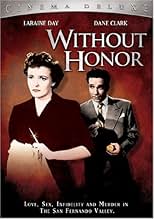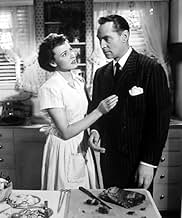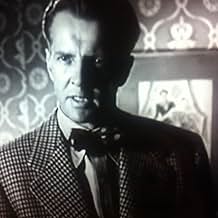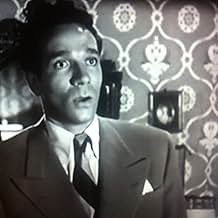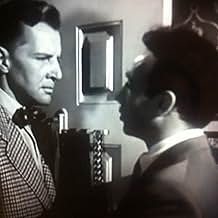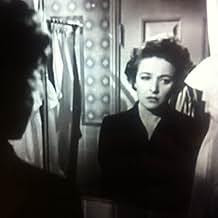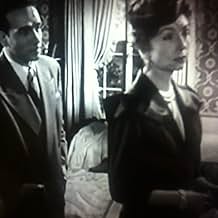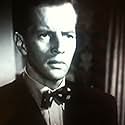Jane Bandle has recently married, but Bill, her husband's brother, tries to wreck her marriage because Jane rejected his sexual advances before her marriage.Jane Bandle has recently married, but Bill, her husband's brother, tries to wreck her marriage because Jane rejected his sexual advances before her marriage.Jane Bandle has recently married, but Bill, her husband's brother, tries to wreck her marriage because Jane rejected his sexual advances before her marriage.
- Awards
- 1 nomination total
Marjorie Stapp
- Neighbor's Wife
- (as Margie Stapp)
Irving Pichel
- Narrator
- (voice)
- (uncredited)
- Director
- Writer
- All cast & crew
- Production, box office & more at IMDbPro
Featured reviews
Without Honor is a 1949 film directed by Irving Pichel and starring Laraine Day as an adulterous housewife in the Los Angeles burbs who has a sort of intervention conducted by her psychotic brother-in-law (Dane Clark) because he's getting even for spurning him and marrying his brother years before.
He arranges for Day and his brother (Bruce Bennett) to be home when Day's lover (Franchot Tone) and his wife (Agnes Moorehead) drop by so he can expose her and get his revenge. Just another sunny day in the burbs.
What Clark doesn't know is that earlier that afternoon Day and Tone had a big fight and break-up and when Day tried to kill herself with a shish-kabob skewer he accidentally fell on it while wrestling it away from her and stabbed himself to death. He's in the laundry room on the floor.
When Clark arrives, he taunts Day, who is about to skip out in a taxi. He goes on and on about how she got him drunk on beers when he was 18 and he made a fool of himself and he's never gotten over it. Day has other things on her mind. Moorehead shows up with no idea why she's there. Bennett comes home from work. Tone is a no-show.
Moorehead has a chat with Day and tells her she knows all about it ... and all his previous dalliances. Bennett pitches a fit, so Day runs into the bathroom and tries to slice her wrists with a razor blade. They call an ambulance but by then they discover that Tone isn't in the laundry room. Keep that ambulance a-comin'.
Everyone in the cast is quite good even if the film is a tad over-the-top. Certainly an interesting post-war take on placid suburbia. Gorgeous cars! Tone drives a 1948 Studebaker convertible and Moorehead drives a 1948 Packard sedan.
He arranges for Day and his brother (Bruce Bennett) to be home when Day's lover (Franchot Tone) and his wife (Agnes Moorehead) drop by so he can expose her and get his revenge. Just another sunny day in the burbs.
What Clark doesn't know is that earlier that afternoon Day and Tone had a big fight and break-up and when Day tried to kill herself with a shish-kabob skewer he accidentally fell on it while wrestling it away from her and stabbed himself to death. He's in the laundry room on the floor.
When Clark arrives, he taunts Day, who is about to skip out in a taxi. He goes on and on about how she got him drunk on beers when he was 18 and he made a fool of himself and he's never gotten over it. Day has other things on her mind. Moorehead shows up with no idea why she's there. Bennett comes home from work. Tone is a no-show.
Moorehead has a chat with Day and tells her she knows all about it ... and all his previous dalliances. Bennett pitches a fit, so Day runs into the bathroom and tries to slice her wrists with a razor blade. They call an ambulance but by then they discover that Tone isn't in the laundry room. Keep that ambulance a-comin'.
Everyone in the cast is quite good even if the film is a tad over-the-top. Certainly an interesting post-war take on placid suburbia. Gorgeous cars! Tone drives a 1948 Studebaker convertible and Moorehead drives a 1948 Packard sedan.
What an odd picture. An Overwrought Melodrama with a capital O and a capital M this breaks out of the starting gate hitting high C and continues at a fevered pitch right up to its conclusion.
Unhappy Laraine stabs caddish Franchot by accident then rambles hysterically while the callously odious Dane Clark circles around making her life hell. The one beacon of restraint in the entire enterprise is Agnes Moorehead who shows up none too soon and steals the picture with a controlled and dignified performance while all around her her cast-mates are swallowing scenery whole.
Unhappy Laraine stabs caddish Franchot by accident then rambles hysterically while the callously odious Dane Clark circles around making her life hell. The one beacon of restraint in the entire enterprise is Agnes Moorehead who shows up none too soon and steals the picture with a controlled and dignified performance while all around her her cast-mates are swallowing scenery whole.
I saw this when I was 10, when movies were double features and the fare changed weekly. I only remembered it because I loved Day, not because of being an actress, but because she was Leo Durocher's wife and I was a Baseball nut. I saw it again recently on TCM. This movie defies a reason for being, except that the studios needed constant fodder and this film proves the point that it was often volume over content. We are still being crammed with movies that ask the same question, What Were They Thinking, but lack the old excuse.
Day's acting, consisting primarily from 'reacting', is an embarrassment on the same footing as the unlikely dialogue given to the rest of the cast. Her opening scene with Clark makes for great comedy as she goes thru a 360 degree range of reactions to his 25 or so separate avenues of dialogue, mostly questions she never answers. And he's oblivious to the strangeness of her conduct. From there it only gets worse.
It's hard to believe it's the same Day who shown so brilliantly in Mr. Lucky or a movie with such confusing plot turns, but unlike The Big Sleep, where you didn't notice or care.
Day's acting, consisting primarily from 'reacting', is an embarrassment on the same footing as the unlikely dialogue given to the rest of the cast. Her opening scene with Clark makes for great comedy as she goes thru a 360 degree range of reactions to his 25 or so separate avenues of dialogue, mostly questions she never answers. And he's oblivious to the strangeness of her conduct. From there it only gets worse.
It's hard to believe it's the same Day who shown so brilliantly in Mr. Lucky or a movie with such confusing plot turns, but unlike The Big Sleep, where you didn't notice or care.
This Odd Film is Loaded with Edgy Entertainment that Challenged Censors.
In this Downbeat Norish Drama it Confronts Head-On... Adultery, Murder, Suicide, and a Bi-Sexual Incestuous Obsession.
The Wordy Script Takes Place in One Location in a Few Rooms.
With Loraine Day Giving a Difficult Almost Wordless Performance.
The Writing is Sharp and the Performances are Top B-Movie Gold.
The Film's Downfall, if it has one, is the Constant Verbiage and Run-On Dialog by Dane Clark.
It is the Antithesis of Day's Silent Portrayal.
Clark's Constant Jabbering is a Dated, Nervous, Non-Stop Accosting of His Brother's (Bruce Bennett) Wife and His Brother.
He Reveals an Unhealthy Attachment to His Sibling.
Also an Equal Hatred for and Jealousy of Loraine Day.
His Actions are Loathsome and Neurotic.
With Relentless Force and those Dated Antics may be Difficult for some Viewers to Watch.
Along with Bennett, Agnes Moorehead, in a Minor but Crucial Role is Outstanding, but so is the Entire Cast.
Underlined by Max Steiner's Striking Score and a Plot Twist or Two.
The Ensemble Production Manages to Compel the Overloaded Story. And Bring it Together for a Strange and Unique Viewing Experience, Especially in 1949.
Above Average and Certainly...
Worth a Watch.
In this Downbeat Norish Drama it Confronts Head-On... Adultery, Murder, Suicide, and a Bi-Sexual Incestuous Obsession.
The Wordy Script Takes Place in One Location in a Few Rooms.
With Loraine Day Giving a Difficult Almost Wordless Performance.
The Writing is Sharp and the Performances are Top B-Movie Gold.
The Film's Downfall, if it has one, is the Constant Verbiage and Run-On Dialog by Dane Clark.
It is the Antithesis of Day's Silent Portrayal.
Clark's Constant Jabbering is a Dated, Nervous, Non-Stop Accosting of His Brother's (Bruce Bennett) Wife and His Brother.
He Reveals an Unhealthy Attachment to His Sibling.
Also an Equal Hatred for and Jealousy of Loraine Day.
His Actions are Loathsome and Neurotic.
With Relentless Force and those Dated Antics may be Difficult for some Viewers to Watch.
Along with Bennett, Agnes Moorehead, in a Minor but Crucial Role is Outstanding, but so is the Entire Cast.
Underlined by Max Steiner's Striking Score and a Plot Twist or Two.
The Ensemble Production Manages to Compel the Overloaded Story. And Bring it Together for a Strange and Unique Viewing Experience, Especially in 1949.
Above Average and Certainly...
Worth a Watch.
Wild film.
Laraine Day as Jane is cheating on her husband (Bruce Bennett) with Franchot Tone. However, he breaks up with her, and during a struggle, she kills him.
While he is dead in another room, her brother-in-law (Dane Clark) shows up. He wanted her at one point, but she rejected him.
So he has called a revenge meeting, inviting the dead man's wife and the dead man himself, not realizing it a bit late for that, planning to surprise his brother with the news that his wife is a cheat.
Given that the man is dead, there are other surprises in store.
Laraine Day, understandably, plays a totally wired and half-hysterical woman. She does a good job, but the film feels off balance and frantic. Dane Clark's character clearly has a screw loose.
I would call this an odd film. And how much did they pay Franchot Tone to spend all that time on the floor?
Laraine Day as Jane is cheating on her husband (Bruce Bennett) with Franchot Tone. However, he breaks up with her, and during a struggle, she kills him.
While he is dead in another room, her brother-in-law (Dane Clark) shows up. He wanted her at one point, but she rejected him.
So he has called a revenge meeting, inviting the dead man's wife and the dead man himself, not realizing it a bit late for that, planning to surprise his brother with the news that his wife is a cheat.
Given that the man is dead, there are other surprises in store.
Laraine Day, understandably, plays a totally wired and half-hysterical woman. She does a good job, but the film feels off balance and frantic. Dane Clark's character clearly has a screw loose.
I would call this an odd film. And how much did they pay Franchot Tone to spend all that time on the floor?
Did you know
- TriviaThis film offers a rare glimpse at a contemporary 1949 television set, a bulky table model with a ten-inch rectangular screen, which commonly was required to be "set up" by qualified technicians who also needed to install an antenna on the roof before proper reception could be achieved. Commercial television broadcasts had begun in Los Angeles two years earlier in 1947 on KTLA (Channel 5).
- GoofsJane is said to have broken a heel In the fall that caused her to miss her escape by bus, but as she picks up a broken heel off the ground and carries it with her, the heels on the shoes on both her feet remain intact and attached.
- Quotes
Fred Bandle: [picking Jane up on the dusty road, oblivious to her foiled attempt at escape] Where were you? Out for a walk? You busted a heel, huh? Well you shouldn't wear heels on a street like this.
Details
- Runtime
- 1h 9m(69 min)
- Color
- Aspect ratio
- 1.37 : 1
Contribute to this page
Suggest an edit or add missing content

